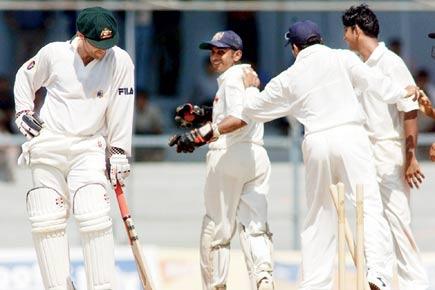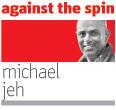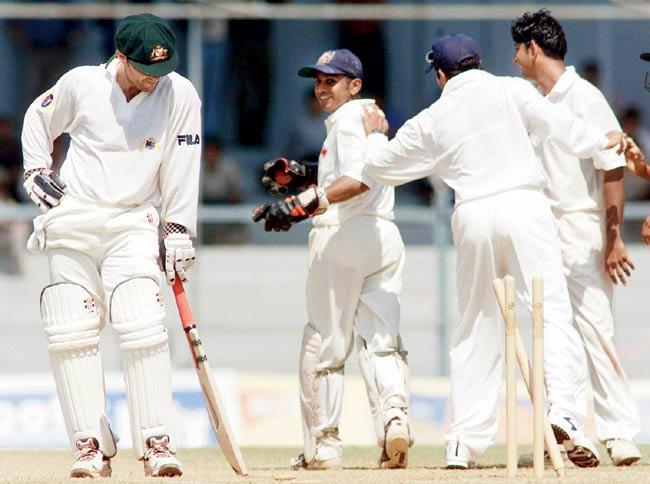A loss was usually attributed to biased umpiring, doctored pitches, and foreign food (as if lasagna was a native Australian delicacy!), writes former first-class cricketer, Michael Jeh

 Brisbane: Born in Sri Lanka, senior education (and cricket) in Australia, professional cricket career in England, played cricket all over the world.
Brisbane: Born in Sri Lanka, senior education (and cricket) in Australia, professional cricket career in England, played cricket all over the world.
ADVERTISEMENT
For a below-par first-class cricketer, I have experienced cricket all over the world but writing about my true love for a broadly Indian audience carries a word of warning; I carry no bias whatsoever. My brief is to wax philosophical, poke fun at hypocrisy and ask questions of the 'system' without any patriotic bias. It is a cricket journey without borders, often seeking to polarize and always trying to play against the spin!
Unique perspective
Living in Australia for the last 30 years has given me a unique perspective on the narrow lens through which cricket in the sub-continent is viewed. It was not so long ago when the 12th Man skits by Billy Birmingham, parodying the Asian cricketer, were all the rage in popular culture.
Even if you were an accidental victim of it, as I was growing up in the brutal environment of grade cricket, you were expected to laugh at yourself, even when the racial stereotypes hinted at a cricketing supremacy that went beyond cricket.

Australia’s Michael Slater stands his ground after being stumped by Mumbai’s Sameer Dighe (c) on February 23, 2001. Pic/Getty Images.
Any weakness or sensitivity was pounced upon as a sign of a thin skin, associated with the inability to also play short-pitched bowling and play the game like “real men”. Cricket in that era was a subtext to the way colonialism was meant to work – as long as the damn colonials played by those rules!
Touring the sub-continent was a mission to be endured through gritted teeth. The odd loss was usually attributable to biased umpiring, doctored pitches, poor hotels and foreign food (as if lasagna was a native Australian delicacy!). Undeniable feats of courage like Dean Jones’ epic innings in Madras were spoken of in hushed tones as if no cricketer coming to Australia had ever faced similar hostile conditions.
The legends that were Sunil Gavaskar, Gundappa Vishwanath and Kapil Dev were written off as mere local champions, no allowance made for their amazing record against the West Indies, the benchmark of that era.
That was before satellite television and the rise and rise of the Indian middle-class, educated and mobile, spreading their talents across the globe. Fast forward a few years and India is now the new darling of world cricket. No longer is a tour of India greeted with a groan and a predictable joke with a fake accent and an exaggerated shake of the head.
It is the beating heart of cricket for the players, coaches, medical staff and even for writers like myself. Ironically, my Asian heritage, once a millstone for being taken seriously as a cricket writer, is no longer a disadvantage, even in Australia. India is the new black but exclusively so – the other Asian cricket nations are still viewed much as they always have been – with a mixture of exoticism, suspicion and a hint of that first world arrogance.
The winds of change began to blow long before the Indian Premier League was born. Perhaps it coincided with Sachin Tendulkar’s career and the mass marketing that followed, turning India’s love of the game into a global marketing opportunity for anyone prepared to shed the cloak of colonial superiority.
Cricketers like Allan Border and Steve Waugh kickstarted that revolution and you get the feeling that their affection for the new heart of cricket was totally genuine. Perhaps that was one of the reasons why they played so well on Indian pitches – their mindset was already positive before they took guard. Love was in the air and India was more home than honeymoon. The IPL is the ultimate symbol of the willing surrender to the arranged marriage!
Don’t get me wrong – the affection is not yet sealed with an unconditional kiss. For those in cricket who are not feeding from the fruits of Indian trees, there is an acknowledgement that the new world order is upon us but do not confuse that with adoration.
Wait till you listen...
You only have to play lower grade cricket or listen to conversations at BBQs to realise that there is still a yearning for the days when men were men and sheep were nervous.
The cricketers themselves dare not even contemplate a future without India but their narrow focus is entirely pragmatic – the other South Asian cricketing centres may as well be from another planet.
At board level, this has now become a shameless policy where it is now essential to survival to pick and choose the partners you wish to dance with, even if the tune is Bollywood and the goddam pitches still turn square on day one. Losing to India is still worth banking on.
Looking amusedly from afar at this seismic shift in attitudes, I recall a friend of mine who came along to watch a Test match at the Gabba between Australia and Sri Lanka in 1990. His comments that day came from the heart I’m sure and reflected an uncompromising view of the way cricket should be played – the Australian way. Years later, watching him succeed in India, on the field and in the boardrooms, I smiled wryly at how quickly those attitudes were calibrated to reflect the new reality. It’s the new ‘bromance’.
It is a theme I will explore in this column as we seek to expose hypocrisies and marriages of convenience that have everything to do with commerce and little to do with what is good for cricket.
Indians no doubt are familiar with arranged marriages but this is more like a shotgun marriage with the gun now firmly in the other hand. Dowries are paid in rupees and the poorer in-laws still pretend that they had a choice. Sledging is still rife but it can no longer cut across racist boundaries, as if the stuff that happened when the West Indies were ruling the world didn’t really matter.
And therein lies the difference. It’s one thing to win cricket matches but it’s an entirely different matter when you control television rights. Reggae is now Bollywood and we’re all singing along to the words of Cyndi Lauper’s 1980s anthem “Money Changes Everything”.
Money changes everything. We think we know what we’re doing. We don’t pull the strings. It’s all in the past now.
10: The number of years it took Australia to tour India again after the 1969-70 series
Michael Jeh, a former first-class cricketer, will write a fornightly column for this newspaper
 Subscribe today by clicking the link and stay updated with the latest news!" Click here!
Subscribe today by clicking the link and stay updated with the latest news!" Click here!






